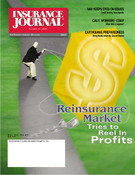Insurance Journal senior writer Dave Thomas recently interviewed Dan Dyce, Disaster Response Manager for the California Earthquake Authority (CEA). In this capacity, Dyce, who has been in the industry 29 years, coordinates the CEA’s earthquake disaster response with the 18 member insurance companies who take and process the CEA claims. He also speaks across the country on earthquake policies.
Dave Thomas: What is your role when a major earthquake happens?
Dan Dyce: After a major earthquake, I actually go to the site of the earthquake. In other situations, I evaluate have fire trucks been rolled out, is there damage? There are certain people we call to activate our response. There are 18 member companies in the CEA and each one has a disaster response liaison. I would meet with those 18 people in a hotel room close to the earthquake and coordinate the disaster response. My big push as a property claims person is to make sure the insureds gets every single bit of coverage they have available to them.
Thomas: What are the challenges to your job?
Dyce: Making sure everyone is in a high state of readiness is important. One of the things I do is work with the agents who sell the product. From an agent standpoint what we’re doing, as they sell the policy informing and educating insureds about the policy, a big part of my job is eliminating the misconceptions out there. There’s a misconception that you don’t need to buy earthquake insurance, FEMA is going to come in and help me out. That’s not the case.
Thomas: Do you think in this day and age with an absence recently of Northridge-type quakes, it is tough to sell earthquake insurance?
Dyce: We’ve had around 800,000 people buy earthquake insurance, so obviously there’s a need for it. Earthquakes do sell insurance. I see myself as a Super Bowl coach, except when you’re getting ready for a Super Bowl, you have a pre-season and a regular season where you can assess all your players. We have a Super Bowl coming and we don’t have a pre-season and any games, we’re constantly training. There are these independent claims representatives, these catastrophe teams all over the country that will come to California following a big earthquake. One thing I’ve done is a preemptive strike in being all over the country training these national catastrophe teams.
Thomas: Are there other people in a similar role to yours’ across the country?
Dyce: The CEA is the only risk pool in the country. In the other states, they actually sell it as a companion to the regular homeowners. There’s a big earthquake risk in the Midwest with that new Madrid fault. People there are doing preparation, but we’re unique.
Thomas: Are there any changes to the earthquake policy?
Dyce: We’re coming out with a revised policy in January of 2003. There are four good improvements to it. First, we’ll be paying replacement costs up front. Secondly, this policy has some things that are not currently covered. For example, we’ve added a new provision that says if you have certain items (stained glass windows, chandeliers, etc.) we’re not going to pay for them, but we’ll give you a functional equivalent replacement that was not in the old policy. Another improvement is on chimney damage. Chimneys are limited to $5,000 on the current policy. We still won’t pay more than $5,000 for that chimney, but in the new policy, we’ll use all of the covered chimney damage in the deductible calculation which will help the insured get over their deductible faster. Another good thing about our policy is that insureds do not have to spend any of their own money before they collect on this policy. Under the new policy, we pay replacement costs even before the insured does the repairs. Furthermore, some people may have a misconception that if they have a 10 percent deductible, they have to spend the amount of their deductible before they get a check. That’s not the case. We’ll evaluate the loss, and pay them an amount less the deductible, again—even before repairs are made.
Thomas: Are you finding after all these years, people are building differently?
Dyce: Yes, a lot of it is being driven by building codes. The engineering community has learned more about what will stand up to an earthquake.
Topics Catastrophe Natural Disasters
Was this article valuable?
Here are more articles you may enjoy.


 Kyle Busch and Wife Settle Lawsuit With Pacific Life and Insurance Agent
Kyle Busch and Wife Settle Lawsuit With Pacific Life and Insurance Agent  Zurich Insurance and Beazley Agree to $10.9B Cash Acquisition
Zurich Insurance and Beazley Agree to $10.9B Cash Acquisition  What Berkshire’s CEO Abel Said About Insurance
What Berkshire’s CEO Abel Said About Insurance  Marsh Awarded Injunction Against Former Employees Now With Howden US
Marsh Awarded Injunction Against Former Employees Now With Howden US 


